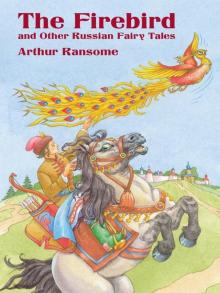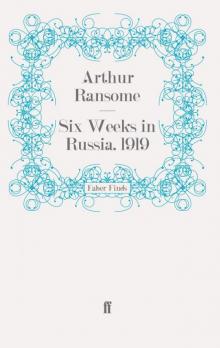- Home
- Arthur Ransome
Missee Lee Page 12
Missee Lee Read online
Page 12
Big paper lanterns had been lit in the house and, when she came into the room with the long table she saw Nancy and Peggy, John and Susan, looking much less tired and more like themselves, standing in a bunch, while half a dozen Chinese, all with big revolver holsters slung at their sides, were looking down at Roger who was trying to talk to the one whom Nancy had called “our” captain. Roger ran to meet her the moment he saw her.
“Jolly decent,” he said. “A woman in trousers brought us a basin with hot towels to wipe the dust off our faces.”
Titty wished the Taicoon had thought of doing as much for her.
The Taicoon waved a hand towards the other Chinese.
“My captains,” he said, and explained, “Captains of my ships.”
He took his seat in a carved and cushioned chair at the middle of the long table. He made Titty sit at his right hand, John at his left. Roger plumped himself on a chair next to “our” captain to whom he had been talking. Nancy, as an old acquaintance, worked herself next to her captain on the other side. Prisoners and pirates sat down to supper together. No one could have guessed, to look at them, that there had been any talk of chopping heads. The pirates smiled at their neighbours, loosened their belts and put their pistol-holsters on the table. Opposite each chair was a plate, painted with birds, and a pair of chopsticks. Titty saw that Roger was wasting no time but was busy making “our” captain show him how to hold them.
“Thumb and finger for one,” he called to Titty. “And the other between two fingers. All in the same hand. And then you use them like crabs use their claws.”
Titty caught Susan’s eye. “What about Captain Flint?” she asked.
“They were bringing him his supper,” said Susan.
The Taicoon understood. He spoke to one of the servants, and smiled at Titty. “San Flancisco all light,” he said. “Chow allee same Taicoon.”
Green and gold bowls were set before them. Titty looked warily into hers. Clear soup, with a lot of pale rice at the bottom of it. But no spoon. She looked round, hoping that someone else would begin and show her what to do. She saw the Taicoon lift his bowl and drink from it. She did the same. Then she saw that the captains were not drinking quietly like the Taicoon. They sucked the soup noisily and smacked their lips. Guests, of course. That must be the proper thing to do. They were politely showing how good they thought the soup. So Titty sucked the soup in as noisily as she could and licked her lips. She saw Susan looking at her in horror. But John was following the example of the captains. Nancy outdid them all. Roger choked and was politely patted on the back. That was all right. But what about the rice in the bottom of the bowl? There the Taicoon showed her the way. Taking both chopsticks and keeping the ends of them together, he put the edge of the bowl to his lips and with a quick, sweeping, circular motion swirled the wet rice into his mouth. That, she found, was none too easy, and she was very glad when one of the captains simply threw his head back and tipped what was left of his rice straight down his throat.
Much larger bowls were now being put on the table, and the guests began to help themselves, taking things now from one bowl and now from another.
“Shark’s fin,” said the Taicoon, putting a bit on Titty’s plate.
There were all kinds of things in the bowls. There were noodles, and little bits of fried meat, and little bits that might have been fish or might not, soaked in sauces that made Titty’s eyes water and made Roger secretly put out the tip of his tongue to cool it.
Suddenly Titty saw Roger staring at her across the table, at her and at the Taicoon. The Taicoon, who had just used his chopsticks to put something in his mouth, had picked a titbit off his plate and, smiling politely at Titty, was poking it at her face. Titty looked at it and at him. There was nothing else to be done. She opened her mouth. The Taicoon popped the titbit in. Titty chewed it up, wishing she could spit it out instead, and then, seeing the Taicoon’s face, smiled at him, smacked her lips and said, “Thank you.”
It was as if a signal had been given. Looking right and left along the table, Titty saw that all the captains were doing the same for their next-door neighbours.
“Here, I say,” said Roger, but, when he saw what was happening even to Susan, opened his mouth and smacked his lips like the rest of them.
More and more bowls were brought to the table and every now and then a piled plate was carried out of the room, when the Taicoon would point out to Titty what was happening, and would say, “San Flancisco chow” and Titty would smile back at him and say, “Thank you very much.”
At last, one after another, the pirate captains made loud noises of having eaten too much. Little cups of pale tea were brought in. Nancy’s captain pushed a bowl of meat-balls towards Roger. But Roger, even Roger, could eat no more and explained that this was so by tapping first the table and then his stomach to show that he was tight as a drum. The captain laughed and did the same, and presently all the pirate captains were tapping the table and tapping their stomachs while their host, the Taicoon, Chang, rolled in his seat with happy laughter.
And then, unexpectedly, Titty, tired out, found her head nodding forward. She hurriedly held it up, smiled at nothing, and nodded again. The Taicoon, sitting beside her, laughed, tossed down his cup of tea and rose from his chair. The captains stood up. The Taicoon spoke to a servant. Two guards with rifles came in and waited at the door. It was clear that the party was over.
One by one the prisoners shook hands with the Taicoon and said, “Thank you”. The Taicoon said, “Velly pleased”. The pirate captains smiled and bowed. Then, while the prisoners were walking to the door, they sat down again at the table. Servants were bringing in more cups of tea, and little bamboo pipes with metal bowls. Suddenly the Taicoon shouted a question after his guests.
“Lord Mayor San Flancisco,” he asked. “Him velly lich man?”
No one knew what to answer. Captain Flint certainly wasn’t. Ought they to say he was very rich or not?
“Velly gleat man?” said the Taicoon, putting his question differently.
“Very great,” said Nancy.
And the Taicoon, leaning on the table, began to talk with his captains.
*
They came out with their guards into the cool of the courtyard.
“Barbecued billygoats,” said Nancy. “Just think of grubbing with a pirate chief.”
“That you people?” A voice came out of the dusk, and, before the guards could stop them, they raced across to talk to Captain Flint.
“Gosh,” said Captain Flint. “They gave me such a supper that I began to think they were going to hang me in the morning.”
“Are you going to sleep here?” asked Susan.
“I’m all right,” said Captain Flint. “There’s a comfortable hole at the back. I’ve slept in worse places before now. What about you?”
“Much better than where we were,” said Nancy.
“They’ve put Gibber where they were,” said Roger. “But they gave him some more bananas.”
“I say, Titty,” said Captain Flint. “How did you get so pally with the big chief?”
“Birds,” said Titty. “It was Polly did it really.”
“He didn’t let out anything when he was talking to you?”
“Not exactly.” Titty hesitated. “He said that he’d look after Polly if Missee Lee cut off our heads.”
“Nobody’s head’s going to be chopped off,” said Captain Flint.
One of the guards said something in Chinese.
“We’d better go,” said John.
“Don’t worry about anything,” said Captain Flint. “We’ll get some sense out of somebody in the morning.”
*
Light was coming from an open door. The guards hurried them towards it. “Come on, Titty,” said Roger. “You haven’t seen it.”
The guards waited outside the door when they went in. In an empty room, hung with bamboo matting, a Chinese woman was standing by a huge pile of silk cushions.
“Taicoon,” she said, and they knew that Chang must have sent them.
“Polly’s in a room at the back,” said Roger.
The Chinese woman bowed and went out. The door closed behind her. They heard the guards walking away.
Roger ran to the door. It was locked.
“Prisoners all right,” said Nancy. “But Giminy what a lark. I say, John. Do tell us what did happen to Swallow.”
“Tomorrow,” said Susan. “Don’t let’s waste time talking now. Titty and Roger must be nearly dead.”
“All right, Mister Mate,” said Nancy. “So are we and so are you. We’ll just grab cushions and camp down.”
CHAPTER X
ON THE ROAD AGAIN
THE lanterns had gone out during the night but thin slivers of sunshine came through cracks in the shutters into the room where the six prisoners, awake and fresh after a long sleep, were squatting on cushions and piecing together their tales of what had happened. Roger had told the story of Gibber and the hunters for grasshoppers. Nancy had told of what happened aboard the pirate junk. John and Susan, with interruptions from Roger, had told of the house on the island, the books that had vanished, and of how, when they set off after Titty had sighted the Amazon, there had been people coming down the cliff.
“I wonder what happened to the boats,” said Nancy.
“I don’t know,” said John. “There was a whole fleet of sampans coming down the river when we were looking for you. And then there were more of them by our island. They’ve probably collared all our things … Captain Flint’s sextant. … My barometer. …”
“The sleeping-bags,” said Susan. “My first-aid box. … They’ve got every single thing we didn’t have in our pockets.”
“We’ve lost all ours,” said Peggy.
“If they’re going to chop our heads off it won’t matter,” said Roger. “I mean, not having the things won’t matter. Not our heads.” He felt his neck as if to make sure his head was still firmly in its place. “Oh well,” he added, “Captain Flint won’t let them. But I do think they might give us some breakfast.”
Boom!
It was the gong that they had heard the night before. Ten thrumming strokes. They had already heard a good deal of moving about and talking in the courtyard. Now they heard the noise of marching feet and, suddenly, close to them, the voice of Captain Flint, singing:
“Farewell and adieu to you fair Spanish ladies,
Adieu and farewell to you ladies of Spain.
For we’re under orders for to sail to old England,
But we’ll jolly soon see you fair ladies again.”
They rushed to the shuttered windows and tried to look through the cracks. They could see that people were passing. John was the only one to catch a glimpse of Captain Flint.
“Gosh,” he said. “They’ve got him in the hencoop again.”
“He’s saying ‘good-bye’,” said Nancy. “They’re taking him away somewhere.”
“He’s changed the last line,” said Titty.
“He can’t mean they’re sending him off to England without us,” said Peggy.
“Galoot,” said Nancy. “What he means is that we’re going too. Soon see you again. That’s what he means.”
Captain Flint was still singing, further away now, but he was singing the same verse.
“Quick. Quick,” said Titty. “Let’s answer, to show we’re all right. … We’ll rant and we’ll roar. …”
“Come on,” said Nancy and they all sang together:
“We’ll rant and we’ll roar like true British sailors,
We’ll range and we’ll roam over all the wide seas
Until we strike soundings in the channel of old England
From Ushant to Scilly is thirty-five leagues.”
There was no answer. Captain Flint, in his hencoop, had been carried out of the gateway and away.
“I say,” said Titty. “British. … We ought to have made it American because of his pretending to belong to San Francisco.”
“Oh rot,” said Nancy. “He said ‘England’ himself. It’s only a song. They won’t make head or tail of it, anyway. And Ushant and Scilly in the last line will muddle them up.”
*
Steps sounded outside and fumbling at the door. It opened and two of the servants whom they had seen at the Taicoon’s supper came in with trays, on which were bowls with rice and chicken, a bundle of chopsticks and a much smaller bundle of little splinters of bamboo. They set the trays on the floor and went out. Two guards with rifles were outside the door, and, when Nancy made as if to go out, stopped her at once.
“Oh well, here’s breakfast, anyway,” she said. “We’d better eat it,” and the prisoners set their cushions round the trays and hungrily began.
“Bother these chopsticks,” said Roger, taking a bit of chicken in his fingers.
“We’ll have to learn,” said Susan. “It was awful last night. … How do you hold the things? Oh, never mind. …”
They heard a laugh. A shadow fell across them. The one-time cook was standing in the doorway and behind him the two guards were watching them with wide grins.
“Stowee chow chow plenty quick,” said the one-time cook. “Taicoon. …” He waved his hand to show that the Taicoon had gone away. “San Flancisco. …” He waved his hand again. “All go Missee Lee yamen plenty quick.” He lifted both hands to his ears and made a terrific braying noise.
“Gosh,” said Roger. “Donkeys again. And I’m still sore.”
“We walked on our own hoofs yesterday,” said Nancy.
“So did we,” said Susan.
“You don’t know what those donks are like,” said Roger. “I wish we were walking today.”
“Hully up,” said the one-time cook, squatting beside them on his heels.
They hurried up as best they could, sweeping the rice over the rims of the bowls, playing catch-as-catch-can with the bits of chicken, emptying the bowls down their throats. Before they had done, the one-time number one cook went off again, pretending to lift his ears.
“He’s gone to fetch those donks,” said Roger grimly.
“Well, buck up,” said Susan. “Don’t stop to talk about it. Nothing makes people so cross as other people being late.”
They drank their tea. Susan and Peggy put all the empty bowls one inside the other. They made six neat piles of the cushions. They even did a little washing in a huge earthernware basin full of cold water they found in an inner room.
“No toothbrushes,” said Roger.
“That’s what those little bits of bamboo are for,” said Susan who had been looking at the little bundle that had been brought in with their breakfast.
“Toothpicks,” laughed Nancy. “No getting out of it, Roger. Go ahead. We won’t have any toothbrushes till we get to an English ship or a proper town.”
“Well,” said Roger, “if they’re going to cut our heads off I’m not going to bother.” He looked anxiously at Susan.
“I’m going to, anyway,” said John.
“So’m I,” said Nancy. “If they’re going to be beastly to us, I want clean teeth to gnash at them.”
They were using the toothpicks and laughing at each other using them when the Chinese woman who had brought them the cushions the night before came in with a bowl of sunflower seeds. She took it to the parrot’s cage and then looked from Nancy to Susan, from Susan to Titty and from Titty to Peggy. Titty darted forward, took the bowl and thanked her. “It’s the Taicoon again,” she said. “He’s sent some food for Polly.”
“Oh I say,” said Roger. “Gibber can’t go till he’s had his breakfast.”
There was a stamping in the courtyard outside and they caught a glimpse of brightly painted saddles.
“All leddy?” asked the ex-cook from the doorway.
“Come on,” said John.
“Put a grin on, Peggy,” said Nancy.
Titty was hurriedly pouring the sunflower seeds into the parrot’s feeding-box.
Rog
er looked from one to another, and then ran out of the door, dodged between the rifles of the guards, bolted through the men who were waiting with the donkeys, and raced up the courtyard to Nancy’s and Peggy’s prison of the day before. At the small window where they had seen Nancy’s face, Gibber, who had managed to climb up inside, was peering out.
“Come on, Gibber,” said Roger. “You’re coming too. But you’ve got to have some breakfast first.” He began looking for the way to open the door.
“Monkey belong stay here,” said the ex-cook who had hurried after Roger. “You belong see him, bimeby.”
“But he hasn’t had any food,” said Roger, opening and shutting his mouth to show what he meant.
“Plenty chow-chow,” said the man and led Roger back towards the crowd with the donkeys. Titty was coming out with the parrot in his cage. The ex-cook shook his head. “Pallot belong stay here,” he said. “See him, bimeby.”
“That’s all right, Titty,” said John. “It means we’re coming back again.”
“Pallot all light,” said the ex-cook, taking the cage from Titty to carry it back into the house.
“Pieces of eight,” screamed the parrot.
“What him say?”
“Pieces of eight,” said Titty. “Money.”
The ex-cook rubbed his hands. “San Flancisco plenty lich man,” he said.
*
Two minutes later they were off, the six prisoners sitting on those gay but painful saddles, with a man leading each donkey, a dozen guards with rifles walking beside them, and a crowd of onlookers jostling each other to get a better view. They left the courtyard and, busily trying how best to sit their donkeys, came to the outer wall where they had another view of the dragon, lying like a cast snake-skin on the ground while men and women crouched and worked at it. Most of the crowd went no further but stopped to see how the work on the dragon was going on. Only some of the small boys followed them out under the gateway, and turned right with them along the wall, grinning up at them, chopping off fingers with imaginary knives and cutting off heads with imaginary swords.

 Peter Duck: A Treasure Hunt in the Caribbees
Peter Duck: A Treasure Hunt in the Caribbees Racundra's First Cruise
Racundra's First Cruise Great Northern?
Great Northern? Swallowdale
Swallowdale Swallows and Amazons
Swallows and Amazons Winter Holiday
Winter Holiday Missee Lee: The Swallows and Amazons in the China Seas
Missee Lee: The Swallows and Amazons in the China Seas Pigeon Post
Pigeon Post We Didn't Mean to Go to Sea
We Didn't Mean to Go to Sea The Firebird and Other Russian Fairy Tales
The Firebird and Other Russian Fairy Tales Coot Club
Coot Club The Big Six: A Novel
The Big Six: A Novel Six Weeks in Russia, 1919
Six Weeks in Russia, 1919 Secret Water
Secret Water The Big Six
The Big Six Missee Lee
Missee Lee Peter Duck
Peter Duck The Picts and the Martyrs
The Picts and the Martyrs